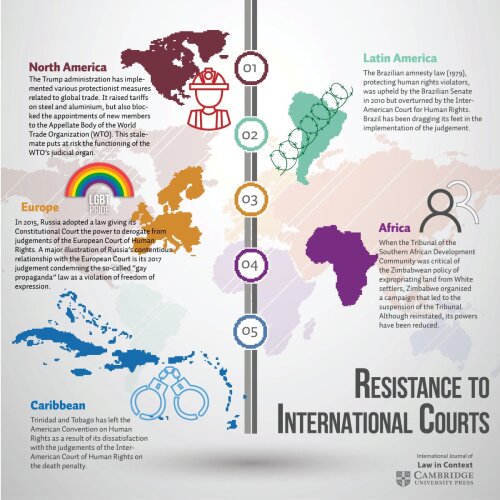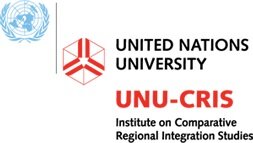Resistance to International Courts

Click image to download
Today, international courts (ICs) are seemingly under pressure from a range of actors, including states, civil society and even legal professionals. At least that is the impression one gets from reading the press and specialized international law blogs. The question is, however, whether such conclusions are premature or are depicting an exaggerated picture of the state of international legal affairs. This project on "Resistance to International Courts" investigates and theorizes different forms and patterns of resistance to international courts (ICs) and develops an analytical framework for explaining their variability.
Most international courts, from the well-known (e.g. the ICC) to the more obscure (e.g. SADC Tribunal), have over the course of their history faced some kind of resistance, backlash or non-compliance. What triggers this resistance depends entirely on context and can vary greatly from case to case, as shown in the infographic above.
This project brings together different cases from all over the world, allowing for a comparison of the various strategies of resistance faced by different international courts: non-compliance (e.g. the European Court of Justice), questioning the development of the law (e.g. Trinidad and Tobago vs. the Inter-American Court) or resistance against establishing a court in the first place (e.g. the African Court).
By bringing together expertise on a variety of international courts and providing an analytical framework, the project aims to provide relevant insights for legal practitioners, students of law and international affairs, researchers and policy makers with an interest in international justice regimes.
Research Questions
Actors
- How do epistemic communities (i.e. transnational networks of lawyers, academics, and so on) impact the process of judicialisation at the regional level?
- To what extent do cooperation and trust (or lack thereof) between national and international judges have an impact on the authority of regional courts?
- What are the reasons for the resistance of national judges to apply regional law?
Process
- How are concepts of EU law (such as supremacy) “translated” through the comparative legal reasoning of regional courts?
- Which national political processes can undermine the acceptance of legitimacy claims of regional constitutional regimes?
- Through which processes do state interests affect the functioning of regional courts
Policy
- What makes certain policy domains more susceptible to principled resistance or refusal to enforce decisions of regional courts?
- To what extent can the tension between economic integration, human rights and the rule of law affect the role of regional courts?
- Can regional courts remedy systematic rule-of-law violations?
Research Results
Publications
Special Issue International Journal of Law in Context: Resistance to International Courts
- Introduction and Conclusion (M. Madsen, P. Cebulak, M. Wiebusch)
- Backlash against international courts: explaining the forms and patterns of resistance to international courts (M. Madsen, P. Cebulak, M. Wiebusch)
- Patterns of avoidance: political questions before international courts (J. Odermatt)
- Parting ways or lashing back? Withdrawals, backlash and the Inter-American Court of Human Rights (X. Soley, S. Steininger)
- Resistance against the Court of Justice of the European Union (A. Hofmann)
- The limits of international adjudication: authority and resistance of regional economic courts in times of crisis (S. Caserta, P. Cebulak)
- The African Court on Human and Peoples' Rights: mapping resistance against a young court (T. G. Daley, M. Wiebusch)
Conferences
Writing Workshop, “Patterns of Resistance against Regional Adjudication”, iCourts/University of Copenhagen, University of São Paulo and University of Brasília, 5-9 June 2017, Copenhagen, Denmark.
Partners







